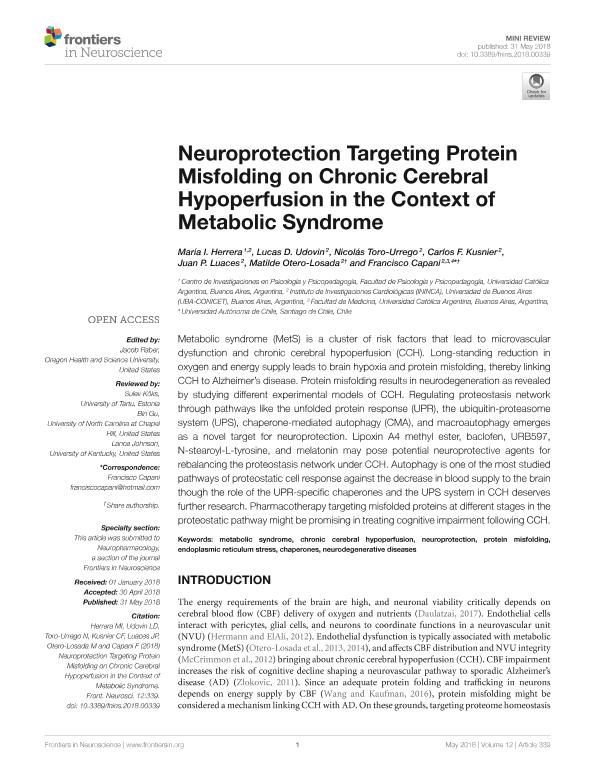Artículo
Neuroprotection targeting protein misfolding on chronic cerebral hypoperfusion in the context of metabolic syndrome
Herrera, María Inés ; Udovin, Lucas
; Udovin, Lucas ; Toro Urrego, Nicolás; Kusnier, Carlos Federico
; Toro Urrego, Nicolás; Kusnier, Carlos Federico ; Luaces, Juan Pablo
; Luaces, Juan Pablo ; Otero-Losada, Matilde Estela
; Otero-Losada, Matilde Estela ; Capani, Francisco
; Capani, Francisco
 ; Udovin, Lucas
; Udovin, Lucas ; Toro Urrego, Nicolás; Kusnier, Carlos Federico
; Toro Urrego, Nicolás; Kusnier, Carlos Federico ; Luaces, Juan Pablo
; Luaces, Juan Pablo ; Otero-Losada, Matilde Estela
; Otero-Losada, Matilde Estela ; Capani, Francisco
; Capani, Francisco
Fecha de publicación:
05/2018
Editorial:
Frontiers Media S.A.
Revista:
Frontiers in Neuroscience
ISSN:
1662-4548
e-ISSN:
1662-453X
Idioma:
Inglés
Tipo de recurso:
Artículo publicado
Clasificación temática:
Resumen
Metabolic syndrome (MetS) is a cluster of risk factors that lead to microvascular dysfunction and chronic cerebral hypoperfusion (CCH). Long-standing reduction in oxygen and energy supply leads to brain hypoxia and protein misfolding, thereby linking CCH to Alzheimer's disease. Protein misfolding results in neurodegeneration as revealed by studying different experimental models of CCH. Regulating proteostasis network through pathways like the unfolded protein response (UPR), the ubiquitin-proteasome system (UPS), chaperone-mediated autophagy (CMA), and macroautophagy emerges as a novel target for neuroprotection. Lipoxin A4 methyl ester, baclofen, URB597, N-stearoyl-L-tyrosine, and melatonin may pose potential neuroprotective agents for rebalancing the proteostasis network under CCH. Autophagy is one of the most studied pathways of proteostatic cell response against the decrease in blood supply to the brain though the role of the UPR-specific chaperones and the UPS system in CCH deserves further research. Pharmacotherapy targeting misfolded proteins at different stages in the proteostatic pathway might be promising in treating cognitive impairment following CCH.
Archivos asociados
Licencia
Identificadores
Colecciones
Articulos(ININCA)
Articulos de INST.DE INVEST.CARDIOLOGICAS (I)
Articulos de INST.DE INVEST.CARDIOLOGICAS (I)
Articulos(OCA HOUSSAY)
Articulos de OFICINA DE COORDINACION ADMINISTRATIVA HOUSSAY
Articulos de OFICINA DE COORDINACION ADMINISTRATIVA HOUSSAY
Articulos(SEDE CENTRAL)
Articulos de SEDE CENTRAL
Articulos de SEDE CENTRAL
Citación
Herrera, María Inés; Udovin, Lucas; Toro Urrego, Nicolás; Kusnier, Carlos Federico; Luaces, Juan Pablo; et al.; Neuroprotection targeting protein misfolding on chronic cerebral hypoperfusion in the context of metabolic syndrome; Frontiers Media S.A.; Frontiers in Neuroscience; 12; MAY; 5-2018; 1-9
Compartir
Altmétricas



